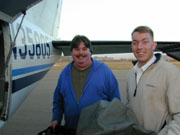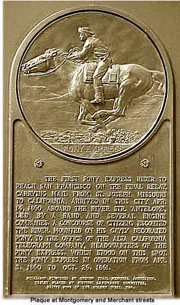Before there was a Pony Express in 1860, Wells Fargo stagecoaches took twenty days to make the trip between St. Joseph, Missouri, furthermost edge of eastern “civilization”, and Sacramento, where ferries completed the journey to San Francisco. But twenty days seemed an eternity to bankers and merchants so three stagecoach men, Senator W.M. Gwin, Alexander Majors and Daniel E. Phelps, came up with a plan for ten day service.

The Boss Man. Ameriflight Division Manager Ken Couche looking natty beside one of his workhorses.
The Pony Express Flies Again
Internet Economy Spurs Speedy Freight Service for Rural Communities
Published: March, 2002
Before there was a Pony Express in 1860, Wells Fargo stagecoaches took twenty days to make the trip between St. Joseph, Missouri, furthermost edge of eastern “civilization”, and Sacramento, where ferries completed the journey to San Francisco. But twenty days seemed an eternity to bankers and merchants so three stagecoach men, Senator W.M. Gwin, Alexander Majors and Daniel E. Phelps, came up with a plan for ten day service.
Six hundred broncos were bought and seventy-five men signed up. The men, all weighing less than 110 pounds, rode night and day in sixty-mile stints. The Pony Express was an immediate success, even though the cost of sending a tissue-thin letter was $5. But it was not to last. Along their route, the riders passed men stringing copper wires for the telegraph service that would render the Pony Express obsolete.
Though it lasted just two years and never made money, the Pony Express commands a lasting hold on the American imagination, perhaps just because it served an important need modestly and well. No financial skullduggery was ever associated with the Pony Express. It inspired an entire genre of Americana literature and film – the “Western”. And now, it’s back.
Frontier towns of yesteryear – places like Placerville, Alturas, Redding and Eureka – are attracting a new breed of resident. These modern prospectors, who profit infinitely better from the information technology world than ever did the 49’ers from mining, are able to enjoy the quality of rural living thanks to modern electronic communications. But many necessities of modern life just can’t be delivered via an Internet connection; things like medicines, urgent financial documents and all other manner of “gotta be there next day” items.
Enter today’s version of the Pony Express, an air courier company called Ameriflight, operating out of Oakland International Airport. Bay Crossings recently visited with Ken Couche, Division Manager for the company.
Couche, who looks like actor Tom Skerrit, presides over a fleet of about 35 small planes. They range from single-propeller Cessnas, able to carry 800-1000 pounds at 140 miles per hour, to sleek Lear jets capable of taking a full ton coast to coast on a moments notice. A mainstay of Ameriflights’ fleet are turboprop Metroliners, twin-engine workhorses that haul 4500 pounds at speeds of 275 mph. About 125 workers keep the operation going.
Aptly enough, it turns out Ameriflights’ mainstay customers are the same as for the Pony Express, banks and merchants. Getting cancelled checks from remote locations to centralized processing facilities is a core business. Overnight film processors are also big customers, as are medical supplies.
But there seems no limit to the kinds of things Ameriflight planes are called on to deliver to rural Northern California “Highway 1, the main road into Eureka, was closed off because a paving machine broke: we got the part there within hours”, Couche relates. “A Native American died unexpectedly far from home and had to be rushed to Arizona because of religious requirements relating to his burial. We got it done in time, which was mighty important to that family. The family even arranged for a Shaman to bless the plane.”
Ameriflight’s planes fly around the clock. They connect Northern California with Southern California and the small towns and cities of the North Coast, Central Valley and Mountains with the Bay Area.
Will the Internet make his service obsolete like the telegraph did the Pony Express? Just the opposite, says Couche. “We don’t sell transportation,” Couche told us. “A truck can get it there cheaper. We sell time. A serious delay for us is four minutes. With the Internet economy, awareness of time has increased at the same time distance matters less and less. For courier companies like us, we now think of statewide deliveries with the immediacy we’d think of citywide deliveries just a few years ago.”.
We tagged along with Erik van Weezendonk, pilot of the morning Oakland to Eureka run, to see what it’s like for the modern version of a Pony Express rider. The old-time Pony Express covered sixty hard miles in six hours, changing horses every ten miles. Erik will make it to Eureka, over 200 miles, in about 90 minutes.
Erik runs through his pre-flight checklist and then loads his planes’ cargo himself. Taxiing past sleek private jets lined up at Oakland International’s General Aviation field, he takes off on time to the minute. Immediately upon getting airborne, he makes a hard swing to the right to avoid making noise over the island of Alameda situated just at the end of the runway.
Noise is a real issue for any airport and any operator and Ameriflight takes it seriously. Ameriflight constantly works with its neighbors and the airport to lessen its impact on the community. “When we’re as quiet as a submarine we’ll know our job is done”, says Couche.
First stop for Captain vanWeezendonk and First Officer Oscar Veerman is Ukiah, where they’re met by courier Terry Page. Once Ukiahs’ cargo is offloaded, it’s back in the air for the short flight to Eureka, where Mike Judge, Dennis Sutton and Amber Snolly are waiting for their deliveries.
Last out of the plane in Eureka is Erik’s mountain bike. Space permitting, the company allows him to take it with him to occupy his day while waiting to make the return trip in the late afternoon. There is also a company car and apartment available for their use.
What would a Pony Express rider of yore think? About the enduring importance of the humble but hardworking Pony Express business plan? About the irony of the Internet economy relying on today’s version of the Pony Express? Or perhaps about how he had to pound out 60 miles in 6 hours on horseback — while Erik gets to ride around Eureka on that bike.

Mike Judge, head courier in Eureka, with modern Pony Express rider Captain Erik van Weezendonk

This historical placque in downtown San Francisco memorializes the original Pony Express. In reality, the Pony Express riders ended their journey in Sacramento, handing their cargo over to an overnight ferry headed to San Francisco.

